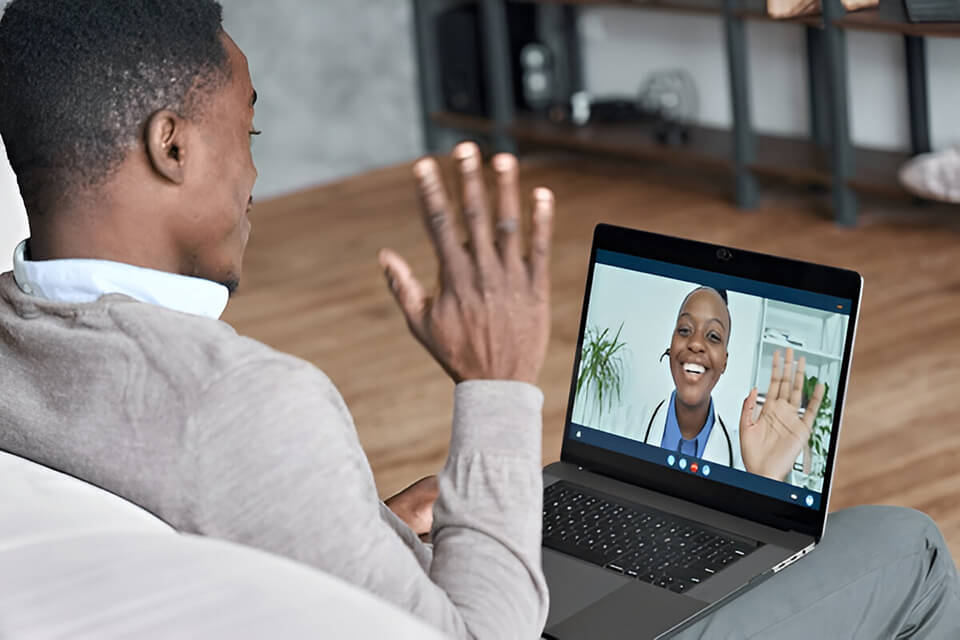- Introduction
- Introduction: African Healthcare
- Overview of Tech Innovation in African Healthcare
- African Tech Startups Revolutionizing Healthcare Through Emerging Trends in HealthTech
- Notable HealthTech Startups in Africa
- Health Data Analytics Of African Tech Startups Revolutionizing Healthcare
- The 5 Roles of Technology in Addressing Healthcare Challenges
- 7 Ways How Tech Startups Are Improving Healthcare Access and Quality
- Case Study
- Frequently Asked Questions (FAQs)
- Conclusion
Introduction
Imagine if seeing a doctor is as easy as ordering food online. African tech startups revolutionizing healthcare in the way we see it. From apps that link patients with doctors in seconds to delivering medicines via drones to remote villages, African tech startups find innovative ways to solve healthcare problems. They have made healthcare accessible and more affordable for millions.
With the long queues people face in hospitals and the limited medical facilities in rural areas, African tech startups revolutionizing healthcare are stepping in with fresh ideas. They are transforming how healthcare operates by leveraging technology such as mobile apps, AI, and telemedicine. This article explores fantastic innovations showcasing how these startups are making healthcare less stressful. After all, who wouldn’t want medical help at their fingertips?
Introduction: African Healthcare
Impact of tech innovation on healthcare
Technology is making a massive difference in how healthcare works in Africa. Technology has changed how the healthcare system works in Africa, making it easier and more accessible. For example, mobile health (mHealth) apps allow people to get medical advice on their phones. This is very helpful for people living where clinics and hospitals may be far away. Telemedicine is another excellent idea. It allows doctors to talk to patients virtually, through video calls, chats and images.
This means you can access medical consultations even if the medical practitioner is in another city. Technology also helps doctors keep track of patient information by using electronic health records. These records are usually backed up and not susceptible to loss. They can also be easily transferred among specialists to help them make better treatment decisions. With technology, healthcare is becoming faster, better, and available to more people than before.
Current State of Healthcare in Africa
The current situation in Africa’s healthcare system shows that much work still needs to be done. Even with the numerous improvements, healthcare in Africa still faces many problems. There are not enough doctors and nurses to care for everyone. According to the World Health Organisation (WHO), “Sub-Saharan Africa faces the greatest challenge and is proportionately the disease burden of the most heavily affected region of the world. One million health workers are needed to bridge the gap in this region. While it has 25 % of the global burden of disease, it has only 3% of the world’s health workers.”
Many countries have very little medication or equipment in their hospitals and clinics. Even simple things like electricity and good roads are a problem. Without these, access to medical care has become very difficult.
Challenges Facing African Healthcare Systems
Many challenges impede proper health care in Africa.
Lack of finance remains one of the biggest problems facing most governments, which cannot afford to invest in adequate health care. While the health sector is not well-financed, the patients’ finances also affect healthcare inaccessibility. Another problem is inadequate infrastructure. Some hospitals lack the proper equipment for some medical issues. On the other hand, when other sectors are not working correctly, the health sector will be affected too. This could be due to poor infrastructure, such as bad roads, lack of electricity, etc.
As one of the most deeply cultural places, some Africans do not access hospitals due to cultural reasons or fear of stigmatisation. Imagine going to the hospital for mental health reasons in a place where anything that has to do with mental health is seen as “madness”. Some fear that it would lead to judgment, so they avoid it. Another issue is that medical practitioners go to other countries or abroad for better working conditions. Some African countries do not adequately care for their doctors, nurses, etc., making them look for greener pastures.
Need for Innovative Solutions
The solution to the problems in Africa requires innovative and creative solutions. The government, businesses and community have to work hand in hand to create a solution. In a country like Nigeria, where many medical practitioners are constantly relocating, it is best to create a good working environment. Another solution could be a mandatory service period for newly licensed medical practitioners. The shortage of professionals could be minimised by training more health workers.
For the peculiar problems in Africa, such as the lack of access to a medical practitioner or a hospital, the development of healthcare apps and telemedicine in general would help. Technology can also develop community health programs to train people in health and self-care. It is advisable to have healthcare education and sensitisation for issues related to culture or stigmatisation. Patients can be encouraged to develop trust in the system. Solutions to these problems require creative ideas in Africa.
Overview of Tech Innovation in African Healthcare
Tech innovation in African healthcare is increasing rapidly, and that brings in exciting changes in how people receive medical care. With the influx of new ideas and technologies, health has started to become more accessible and efficient, especially to the people in remote areas. Let’s dive into the trends and technologies molding healthcare in Africa today.
African Tech Startups Revolutionizing Healthcare Through Emerging Trends in HealthTech
African tech startups revolutionising healthcare are transforming the industry across the continent. With the increasing use of mobile phones, these startups are improving access to medical services, particularly in rural areas where clinics and hospitals are often far away.
Another notable trend is the provision of remote health services. Patients no longer need to travel long distances to consult doctors; they can now use technology to connect with healthcare professionals from the comfort of their homes. This innovation saves time and makes healthcare more accessible, especially during emergencies.

Key Technologies
A number of key technologies are driving innovation in African health:
- Telemedicine: The ability of patients to seek consultation with doctors over their phones or computers. It makes life easier when living in faraway areas from the hospital. Telemedicine is vital during emergencies, when one may need advice or first aid treatment as quickly as possible.
- Artificial Intelligence (AI): AI makes healthcare smarter by helping doctors analyse data and make better decisions. For example, the prediction of analysis . It can also list possible symptoms, assisting doctors t know what to test for. AI is improving how quickly and accurately people can be diagnosed.
- Internet of Things (IoT): IoT includes devices like smartwatches or health trackers that monitor patients’ health. These devices can track heart rate, blood pressure, or other vital signs and send alerts to doctors if there’s a problem. Patients can get help before they understand what’s happening or their condition worsens.
African Tech Startups Revolutionizing Healthcare Regional Hubs for HealthTech Innovation
A few of the cities in Africa are gradually gaining recognition as focal points for HealthTech innovation. Nairobi (Kenya), Lagos (Nigeria), and Cape Town (South Africa) have several startups engaged in creative healthcare solutions. Such cities gather entrepreneurs, investors, and healthcare experts to share ideas and build new technologies.
Governments and private organisations also support these hubs through various investments in healthcare projects. More life-changing solutions are being developed with such support to address Africa’s unique healthcare challenges.
Digital Health Literacy
As technology becomes more important in healthcare, people need to know how to navigate it. This is called digital health literacy. Governments and organizations are teaching communities how to use digital tools like health apps and wearable devices. With better understanding, patients can take charge of their health and make informed decisions.
With tools such as telemedicine, AI, and IoT, major cities incorporating new healthcare solutions, and educational sessions to make sure that no one is left behind, we can see a bright future where everyone will have access to good health in Africa.
Notable HealthTech Startups in Africa
African tech startups are revolutionising healthcare in Africa and Rapidly transforming how health services are delivered to communities. These companies leverage technology to make healthcare more accessible and affordable for all. By embracing innovation, they are driving significant improvements in the continent’s healthcare landscape
mHealth Startups
mHealth startups are at the forefront of the use of mobile phones to bring healthcare to people, especially in places that are far away from hospitals or clinics.
- Medici: Medici is a platform that lets patients talk to healthcare providers on their smartphones. Instead of going to the hospital, you can ask questions, get prescriptions, or receive medical advice directly from your phone. This is very useful for people living in remote areas.
- Mobihealth: Mobihealth pays close attention to how one can manage their health. Services provided by this platform include remote monitoring and health tips on mobile apps. You can use Mobihealth to learn how to stay healthy and make informed decisions about your health.
Telemedicine platforms
Telemedicine allows patients to communicate with doctors from any part of the world without being physically present. This works well for people living in remote areas where healthcare facilities are lacking, and for those that want to avoid the stress of going all the way to see a doctor.
- HealthConnect: HealthConnect provides a video calling facility for patients with doctors. In case you need medical attention, this site can connect you with a doctor, saving your time and money.
Telemed: Telemed advances the cause of telemedicine by enabling patients to consult with specialists from the comfort of their homes. This makes life easier for people and ensures one gets the required healthcare on time.

Diagnostic Solutions
Early diagnosis and accurate diagnosis are crucial for effective treatment. A number of startups are making sure people get quick, inexpensive medical tests.
- mLab: mLab is a mobile diagnostic lab offering affordable tests and fast results. By using mLab, patients can get tested and treated sooner, improving their chances of recovery.
- Zipline: Zipline uses drones to deliver medical supplies like blood and vaccines to remote areas. With its speedy delivery system, hospitals and clinics in far-off places can get what they need to treat patients on time.
Health Data Analytics Of African Tech Startups Revolutionizing Healthcare
African tech startups revolutionising healthcare have become critical to transforming the continent’s healthcare system. These companies leverage technology to analyse patient data, enabling doctors to make more informed decisions. By studying trends in health data, they can forecast diseases, optimise treatment plans, and ensure hospitals manage their resources effectively.
A popular startup dealing with the same field is 54gene, which focuses on genomics and health data to aid doctors in understanding the functions of diseases and searching for better ways to treat or prevent them. These innovations have made healthcare wiser and more productive. It aids the hospital in using time more wisely and reducing cost wastage by providing greater patient care.
- Public-Private Partnerships
PPPs involve governments and private enterprises coming together to resolve specific health problems. They share resources in terms of money, knowledge, and technology for the betterment of the sector. For example, a government might collaborate with a tech company to develop an online digital platform where people can consult doctors without physically going there. PPPs also help build hospitals and equip them with the latest machines and tools.
The other advantage of PPPs is idea sharing. The private brings in new technology while the government supports them with publicity and access to more people. It’s a teamwork that can deal with big health projects that probably one side may not afford. In this way, through collaboration, both public and private sectors are building better health facilities and reaching more African communities with quality healthcare services.
The 5 Roles of Technology in Addressing Healthcare Challenges
Technology helps solve many problems that we face in healthcare, especially in areas where people are struggling to get proper medical care. Let’s see how these five technology roles address these significant challenges.
Improving Access to Healthcare Services
One major problem is that not everyone can see a doctor when they need to, especially in rural areas where there are fewer hospitals or clinics. Technology solves this through telemedicine, which allows patients to talk to doctors using video calls or phone calls without leaving their homes. This way, it’s easier for those living far away or who cannot travel to get medical help. Mobile apps also play a big role in reminding patients to take their medicine or monitor their health so that they may be able to stay on top of their treatment without necessarily having to visit any doctor.
Enhancing healthcare quality and outcomes
Technology is helping to enhance the quality of healthcare services provided. This is because, through electronic health records, doctors can store patient information in one place. This means that if you go to a new doctor, he can easily access your medical history and give you better care. Artificial intelligence is also being used to diagnose diseases more accurately through the study of symptoms and test results. For example, AI can detect cancer early, providing a chance to study recovery for the patient with a better chance of recovery. These tools help doctors make quicker and wiser decisions, which leads to better health outcomes.
Addressing Healthcare Workforce Shortages
Many countries lack sufficient doctors and nurses to attend to everybody’s needs. In such instances, technology fills the gap and makes processes less time-consuming. For example, robots are used during surgeries or employed to do other tasks that take some pressure off the working staff of the hospital to treat and look after their patients more effectively. Online learning sites also facilitate healthcare job training for individuals living far away from a school or university, adding to the pool of competent human resources in healthcare.
Managing Chronic Diseases
Diseases like diabetes and heart problems need regular care and monitoring. Technology makes managing these conditions easier with devices like smartwatches that track your heart rate or blood sugar levels. These devices can alert patients and their doctors if something seems wrong. Mobile apps also help people monitor their diet and exercise, encouraging healthier lifestyles. This kind of technology allows patients to take better control of their health.
Healthcare Infrastructure Development
The use of technology also improves the efficiency of hospitals and clinics, showcasing how African governments support tech innovation in healthcare. By leveraging data analytics, governments can identify areas where more hospitals are needed based on population health trends. Additionally, implementing intelligent systems in hospitals reduces waiting times and streamlines patient management, demonstrating how tech-driven solutions make healthcare services more efficient across the continent.
7 Ways How Tech Startups Are Improving Healthcare Access and Quality
Increasing Healthcare Accessibility
Many people, especially those living in rural areas, cannot see a doctor due to the far distances to hospitals and clinics. Tech startups solve this through telemedicine apps and platforms that allow patients to speak to doctors online. For instance, instead of taking hours to see a doctor, you can have a video call with one using your phone or computer. This saves time and travel costs and makes getting medical help even in emergencies possible.
Reducing Healthcare Costs
Healthcare is unaffordable for most families, but technology startups are making this more affordable. For example, with the help of artificial intelligence, they can predict how many resources a hospital might need, reducing any potential waste. Other startups operate online pharmacies, selling medicines at prices lower than those in manual pharmacies. They can also get diagnosed virtually, eradicating the cost of transporting themselves to the hospital and paying for basic requirements before seeing a specialist. These startups enable patients to save money on medical care through smoother processes and reduced waste.
Improving Patient Engagement and Education
Tech startups are also teaching people more about their health. Applications that explain diseases, treatments, and healthy habits in simple terms are developed. Some remind one when it is time to take medicine, while others allow one to track how they feel each day. These tools help patients stay involved with their care and make better decisions about their health. When people understand their health better, they can avoid serious illnesses and stay healthier for longer.
Facilitating Collaboration Between Healthcare Providers
Doctors, nurses, and specialists all have to share information about patients, which is not always easy. This is where tech startups come in, helping develop platforms where healthcare providers can securely share information. If a doctor and a specialist treat one patient, they can update and view the patient’s history and make better joint decisions. This teamwork means that the patients get the best possible care.
Telehealth Adoption and Best Practices
With the help of technology startups, telehealth has become more mainstream; patients can now see doctors online. It is not all about the technology, though: startups also train doctors to conduct online consultations. They ensure patient data remains private and secure to gain people’s trust in telehealth services.
Regulatory Frameworks for HealthTech
Governments are setting up rules to ensure that HealthTech startups respect safety standards. These rules protect patients’ privacy and ensure the services provided are of quality. Startups that observe these rules win the patients’ confidence and ensure equity in handling all patients.
Scaling HealthTech Solutions
Many tech startups start small but aim to grow their services so more people can benefit. For example, a telehealth service that works well in cities can expand to rural areas with less available healthcare access. By scaling their solutions, startups ensure more people access good healthcare.

Case Study
Remarkably, many young, intelligent people in Africa are focusing on improving and modernising healthcare using technology. These tech startups come up with brilliant concepts and ideas that help people avoid getting sick or treat them if they do fall ill. They are making life much easier for doctors and patients, especially in underprivileged areas with a shortage of hospitals and physicians.
One good company is Pharma. It ensures people can obtain medicine in a hassle-free manner. Patients can purchase drugs through the pharmacy app to avoid making long trips to a pharmacy. For example, if one lives in a remote village, mPharma allows them to order medicine and deliver it to them. This eliminates wastage of time and helps ensure that people are not delayed in seeking necessary treatments.
Another startup is Vezeeta. It allows users to locate the nearest doctors who are accepting new patients. By simply moving their fingertips, patients can view available doctors, read about their qualifications online, and schedule a consultation. This is very helpful because it allows a quick consultation with a doctor without the hassle usually associated with a visit, especially in big cities where it is challenging to locate a specific doctor.
Lesson Learned
With these startups, we see how technology addresses some real-world challenges. They also serve as a reminder that there are young Africans with great ideas that can help improve local healthcare. Through technology and ingenuity, these startups are making medical services accessible to many – even in undesirable or remote areas.
The most significant lesson from this is that innovation flourishes not only in advanced nations like the US or China. It can be accomplished in any region of the world, even Africa, provided we have the right tools and the will to get things done.
To sum up, African health technology startups like mPharma and Vezeeta are the ones who are changing the health sector for the better. They are applying technology to make medical services more accessible, quicker and affordable. This clearly shows how the youth in Africa can rise to the occasion and tackle enormous problems in their countries using technology and sheer effort.
Frequently Asked Questions (FAQs)
1. What are African tech startups in healthcare?
African tech startups in healthcare are new companies that use technology to enhance the delivery of health services and solutions in Africa.
2. How do these startups enhance healthcare services?
These startups develop mobile apps and platforms that allow patients (in remote areas) to book appointments with doctors online, receive consultations, or even order medications for delivery.
3. Can you name some examples of effective African health tech start-ups?
Yes! Some well-known examples include mPharma, which provides affordable medicines; 54gene, focused on genomics and research; and LifeBank, which connects blood donors with hospitals needing blood supplies.
4. What issues do these startups face?
Most of these start-ups have challenges with funding, legal compliance, and unreliable internet connection.
5. Is there support available for new health tech entrepreneurs in Africa?
Yes! Numerous incubators and accelerators throughout Africa help, health tech start-ups with their ideas by offering them mentorship, capital, and other opportunities such as workshops and meet-ups where these entrepreneurs can meet potential investors and other relevant people.
Conclusion
In conclusion, African tech startups are genuinely disrupting the healthcare scene. With their innovative ideas and clever use of technology, they’re improving access to medical care, changing lives across the continent. It is like having a dedicated medical team at your fingertips.
The next time you hear about how African tech startups revolutionize healthcare, remember that these are not just companies. They are hope and help in times of lack. Every innovation launched is paving the way for a healthier future for all Africans – one innovation at a time.



